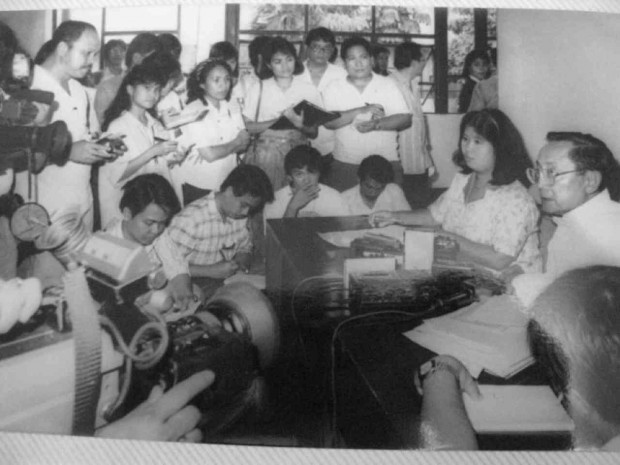Adversarial journalism in the early years

HUNGER for news: Fe Zamora (third from left), is part of the media group interviewing Fidel Ramos. FACEBOOK PHOTO
IF YOU are lucky enough to have worked at the Philippine Daily Inquirer as a young person, then wherever you go for the rest of your life, it stays with you. Because, to complete this insightful phrase borrowed from Ernest Hemingway’s description of Paris in his memoir “A Moveable Feast,”—“PDI is a moveable feast.”
PDI “stays” with me as a sweet reminder of days when I was young, angry, hungry, and foolish. I was in my 20s, angry at the Establishment and suspicious of anyone over 30 years old. I was living within my means, which meant eating three full meals for five days and praying God-will-do-the-rest—until the next pay day.
Hunger for food was easy; it was the hunger for stories to write that actually gnawed at my stomach even when full. I wanted to be a journalist. I wanted to see my name in print, specifically below the banner headline. I wanted to ask THE question that would produce the definitive story of the day. I was a fool to even think SUCH story existed.
My own hunger was shared (for I perceived the hunger was mutual)—by the PDI, which was an upstart among the established crony papers. I was seeking for my appointed place in the crowded, competitive world of journalism. What better newspaper to work for but the newest broadsheet which was antiestablishment, underfunded, and run by editors with oversized egos? Editors who growled on the phone, telling a hapless reporter on the other end that his story was thrash, that he’d be better off planting camote in the boondocks. Intimidation, brinkmanship were games played out in the newsroom everyday. One editor’s order was simple: “Write the story. Leave malice to me.” Survive or die. I vowed to survive.
So we reported for work at the first Philippine Daily Inquirer office at the Port Area one day in November 1985. We covered our assigned beats, and hied back to the office to type our stories on heavy, chunky Remington typewriters. By late night, around 8 p.m., we retired to the National Press Club on Magallanes drive for dinner, and over drinks of vodka tonic on payday, beer the rest of the month we traded dreams of a free press with the self-same reporters we tried to outscoop earlier in the afternoon. We exchanged gossip and tips. We concocted fanciful outcomes of the then boiling political showdown between Ferdinand Marcos and the widow, Corazon Aquino.
Article continues after this advertisementDoors did not open for this promdi with no money or pedigree. Doors, in fact, were slammed on my face—literally. A Constabulary colonel who was then a spokesperson at Camp Crame allowed me into the reporters’ dugout only after giving me a lecture on the meaning of militarization.
Article continues after this advertisement“Hija,” he said, “The mere presence of soldiers in an area is not militarization. Militarization takes place when the military takes over the function of civilians in government agency. Now you know the difference.” He was abrasive, but I was undaunted.
“If we talk to you, will this get published? We are the government. You only publish stories about the NPA and the opposition” was often thrown to my face by government officials and heads of government agencies. This animosity would later provide a perspective to my coverage. It was called adversarial journalism.
This is the kind of Inquirer coverage that I miss most: When I would go on war-footing with the officials in the beat. I doubted press releases, double-checked their statements and debunked their pronouncement by getting the other side of the story.
And this: Statements from spokespersons were not stories as far as I was concerned. Spokespersons were there to confirm or deny a story. But using the spokesperson’s statement as story itself was taboo. The feeling must have been mutual. Soon, officials were warned to “stay away” from me. And everyday on my way to work, I’d remind myself: “I’m not here to make friends. I’m here to get the story.”
And I got my banner stories, but with a price.
One cabinet secretary lambasted me in a press conference. “I’d feed her this newspaper for breakfast,” he said, waving a copy of the PDI. Other reactions were subtle, but more sinister. One day I found myself looking at the taxi driver and recognizing him as the same cabbie that waited at the subdivision gate for three consecutive days. Upon confrontation, the cabbie admitted: “Ma’am trabaho lang po.”
He was an old man, and he trembled when I screamed at him. It’s just work, he insisted. I got off the cab without paying, incensed and a little scared. We were on the same footing: Trabaho lang.
To this day, I still think journalism is work, not a social club where I have to buss the cheek of the officials I get to cover or interview. Then, a handshake was good enough and the best I could offer.
But it was the Philippine Daily Inquirer 30 years ago, when I was young, angry and foolish.